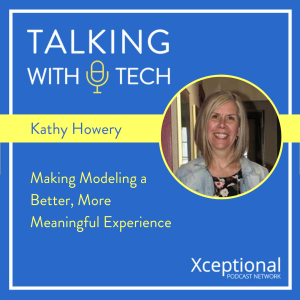Episodes

Wednesday Sep 02, 2020
Wednesday Sep 02, 2020
This week, Chris interviews recent SLP graduates Alexis Martinez and Natalie Fry about their experience focusing on AAC in grad school and their thoughts on how AAC instruction and mentorship can be more effective for graduate students in the future.
Before the interview, Chris and Rachel answer a listener question from a parent who has multiple children who use AAC. This parent has one 3-year-old child who uses LAMP Words for Life (WFL), and another child who uses LAMP WFL - Visual Impairment. Chris and Rachel discuss integrating low tech supports into daily routines, placing those supports around the home, modeling for both kids using high-contrast symbols, and taking a few minutes to model with each child individually.
Key ideas this week:
🔑 It may be better to have a required AAC course early in grad school, rather than later, to better prepare students for the clients they may see early in their clinical training.
🔑 If an early AAC course isn’t an option, AAC and core language instruction can be embedded more into first-year graduate courses
🔑 Guest speakers about AAC can include AAC specialists and local AAC product representatives. Borrowing devices from lending libraries to be used in class is another great way to integrate AAC into graduate courses.
Links:
Previous TWT Episodes with Parents of AAC Users: Caitlin Calder, Dana Nieder, and Erin Sheldon
Help us develop new content and keep the podcast going strong! Support our podcast at patreon.com/talkingwithtech!
Visit talkingwithtech.org to access previous episodes, resources, and CEU credits that you can earn for listening to TWT episodes!

Wednesday Aug 26, 2020
Wednesday Aug 26, 2020
This week, Chris interviews Dr. Kathy Howery, an AAC specialist and educational consultant in Alberta, Canada. Chris and Kathy talk about modeling (aka aided language stimulation) and explore a question Kathy often gets from parents: “Is modeling getting in the way of my natural interaction with my child?”
Before the interview, Chris and Rachel discuss a Spanish version of the AAC Agreements (habloconcaa.wordpress.com), using Microsoft Translate to communicate with someone who speaks another language, and ways that Rachel has been using Zoom to support her students in unique ways!
Key ideas this week:
🔑 We don’t want to focus so much on modeling that we don’t pay attention to what the student is doing. Modeling needs to be a child-focused interaction, not a performance activity.
🔑 Modeling without expectation doesn't mean that we don't pay attention to what the AAC user says or does in response. We should try and honor multi-modal communication and pay attention to what the AAC User is trying to communicate.
🔑 Videotaping yourself is a good way to learn about how you model with students and how much you engage in expectant pauses. It is important to inhibit our natural inclination to fill silence with talk.
Help us develop new content and keep the podcast going strong! Support our podcast at patreon.com/talkingwithtech!
Visit talkingwithtech.org to access previous episodes, resources, and CEU credits that you can earn for listening to TWT episodes!

Wednesday Aug 19, 2020
Wednesday Aug 19, 2020
This week, Chris interviews Krista Howard, an AAC Technician and AAC User, and Deanna Wagner, an SLP and AT Specialist, about supporting AAC users and family members in the community through Out & About. They discuss the Out & About program, the fun they have with AAC users and family members, Krista’s work as an AT Technician with Gompers, how Krista supports AAC and literacy, and Deanna’s experiences in Singapore with AAC.
Before the interview, Rachel and Chris discuss dealing with parents who don’t want to provide assistive technology for their child because they see it as a “crutch.” Rachel talks about a dyslexic client who needed tools like Read&Write for Chrome and Grammerly, and how she brought the client’s parents around to supporting these important tools.
Key ideas this week:
🔑 Out & About selects activities each week that support the development of communicative competence (linguistic, operational, social and strategic skills) for AAC users and their family members.
🔑 The leaders of Out & About share the week’s planned activities ahead of time with its members, along with key vocabulary words. This gives everyone a chance to practice and familiarize themselves with key vocabulary beforehand.
🔑 One popular Out & About activity is their treasure hunt! AAC users pair up with a partner, often a family member, to take a picture of an item that they can find within a particular category. Afterwards, everyone gathers to vote on which words best match which picture!
You can purchase the Out & About manual by Deanna Wagner, Caroline Musselwhite, and Jane Odom on TPT here.
Help us develop new content and keep the podcast going strong! Support our podcast at patreon.com/talkingwithtech!
Visit talkingwithtech.org to access previous episodes, resources, and CEU credits that you can earn for listening to TWT episodes!

Wednesday Aug 12, 2020
Wednesday Aug 12, 2020
This week, Chris talks with Assistive Technology Specialist David Moehn about supporting general education and special education students more effectively with assistive technology (including AAC). They discuss how to train staff more effectively, supporting all students with text-to-speech and speech-to-text, the specific language system first approach, and the benefits of providing AAC and core language instruction to all students in a classroom.
Before the interview, Chris and Rachel answer a listener question: how can we make using AAC more spontaneous and expressive for a child who is accustomed to lots of hand-over-hand prompting? Chris and Rachel offer lots of helpful suggestions for making AAC more motivating, including: changing the appearance of the device, evaluating what the child is most excited about, modeling without expectation, using expected routines, and the benefits of targeting motivating sensory experiences.
Key ideas this week:
🔑 To tempt communication and reduce prompt dependence, combine an expectant pause with an expected routine, like “ready, set….” during a highly motivating activity.
🔑 Some technology supports, like Read & Write for Chrome, can be helpful for both general- and special-education students. For example, all students, not just students with dyslexia, can benefit from listening to their writing before submitting it.
🔑 When AAC and core language is more universally adopted in a district, consults go down over time because everyone is more accustomed to using the app. Many students also use language more expressively when modeling increases in the classroom.
🔑 Look at the time spent by specialists and support staff to train vs the cost of universal deployment of a tool like Read & Write - if teachers and staff are comfortable and do not need training, then less specialist involvement is required overall.
Help us develop new content and keep the podcast going strong! Support our podcast at patreon.com/talkingwithtech!
Visit talkingwithtech.org to access previous episodes, resources, and CEU credits that you can earn for listening to TWT episodes!

Wednesday Aug 05, 2020
Wednesday Aug 05, 2020
This week’s episode features Rachel’s interview with neuropsychologist Dr. Karen Wilson! Dr Wilson shares some of the treatment approaches and assistive technology tools she uses to support children and adults with ADHD, dyslexia, dysgraphia, and language-based learning disorders.
Before the interview, Chris and Rachel answer a reader’s question looking for more on the "Specific Language System First Approach" from the TWT episode with Erik Engar. Chris tells the story of how this term came to be used, revisits some of the reasoning behind this approach, and shares some resources for learning more about it!
Key ideas this week:
🔑 Classroom accommodations that can help children with ADHD include: private signals between a teacher and the student to refocus attention, breaking down instructions into smaller chunks to support working memory, and eliminating distractions with strategies like preferential seating.
🔑 Mindfulness helps with decreasing anxiety, increasing self-regulation, and and improving focus. Using a mindfulness app before beginning schoolwork can help people with ADHD increase focus and get ready to learn.
🔑 Listening to audiobooks (while following along with the printed text) can help children with dyslexia improve their reading comprehension, because they can spend more effort on comprehending the material and not use up all their energy simply decoding the words.
Links & Tools
AAC Spotlight Slides:
Bit.ly/aacspotlightcb
Mindfulness:
Headspace
Calm
Stop, Breathe, Think
Breathe like a Bear book
ADHD:
Revibe watch
Dyslexia:
NaturalReader
Kurzweil
Google Keep
Notability
Read&Write for Chrome
Co:Writer Universal
Snap & Read
Livescribe Smartpen
Top 6 digital scanner pens
Help us develop new content and keep the podcast going strong! Support our podcast at patreon.com/talkingwithtech!
Visit talkingwithtech.org to access previous episodes, resources, and CEU credits that you can earn for listening to TWT episodes!

Monday Aug 03, 2020
Monday Aug 03, 2020
In this episode of Teaching with Tech, Chris and Rachel explore the Picseepal, a low-tech AAC communication tool that protects and organizes low-tech communication boards! Chris and Rachel unbox the Picseepal, talk about how they would use it in therapy, and discuss the importance of Picseepal’s goal of donating 1 million Picseepals to those in need across the world. They also discuss why laminating communication boards is not ideal for protecting communication boards, including: 1) lamination may not last very long, 2) it creates a distraction for some AAC users, 3) recreating damaged boards takes time, and 4) dirty or crumpled lamination looks less professional than a Picseepal.
Links:
To see the video version of this episode, visit talkingwithtech.org/episodes/picseepal
Buy an Early Bird Picseepal at over 40% off (for a limited time) and support their global initiative at startsomegood.com/picseepal
Download Picseepal’s core communication board: bit.ly/picseepaldownload
Learn more about Picseepal: www.picseepal.com

Wednesday Jul 15, 2020
Wednesday Jul 15, 2020
This week, Kevin Williams and Lateef McLeod share about racism and ableism from their perspective as Black AAC users. Kevin Williams is a freelance web developer and the Chief Technical Officer of USSAC. Lateef is a PHD Candidate in the Anthropology and Social Change program at California Institute of Integral Studies, Vice President of ISSAC’s LEAD Committee, and published poet/author. In the interview, Kevin and Lateef discuss the importance of having difficult conversations about racism and ableism, the intersection of race and disability in their own life, and the importance of patience, especially from the police, when communicating with AAC users.
Before the interview, Chris and Rachel discuss the need for more options for AAC users to socialize with other AAC users online, especially during the pandemic.
Key Ideas this Week:
🔑 Have uncomfortable conversations about racism and ableism with people in your immediate circle of friends and family. People are more likely to listen to someone they care about and respect
🔑 Police should inspire compliance with their own behavior, including telling someone why they are being physically restrained, rather than simply demanding compliance. Police need to be the most patient with people with disabilities.
🔑 An AAC user’s personality is communicated by more than the software or voice on a device; it also comes from that person’s gestures, vocalizations, and body language.
Links:
Some of Lateef's books on Amazon
Lateef’s podcast “Black Disabled Men Talk”
Join USSAAC and ISAAC
ISAAC PWUAAC Chat page
Speak Up blog
Body Cam Footage of the Death of Rashad Brooks Warning: Video Contains Graphic Images
Where is Hope, The Art of Murder (the documentary)

Wednesday Jul 08, 2020
Wednesday Jul 08, 2020
This week, Rachel interviews Erik Raj, a Speech-Language Pathologist and app developer. about using apps to make language development more motivating and fun! Rachel and Erik discuss picture-manipulation apps to get students laughing, telling stories with the my story app, making passive screen time more active, teaching students to comment and not just request, integrating parents into therapy with the superherofx app, and more! Learn more about Erik at Erikxraj.com and on Instagram @erikxraj
For extra apps and hacks from Erik Raj and to enter to win Erik’s Your Face Learning apps, become a TWT Patron at patreon.com/talkingwithtech!
Before the interview, Rachel and Chris discuss their presentations on AAC in the Cloud: Chris’s presentation on robots and coding for core language, and Rachel’s presentation with Lauren Enders on attention-grabbing tools. They also share about some of the other interesting presentations from this year's AAC in the Cloud conference.
Visit talkingwithtech.org to access previous episodes, resources, and CEU credits that you can earn for listening to TWT episodes!

Wednesday Jul 01, 2020
Wednesday Jul 01, 2020
This week, Rachel interviews Chris Ellis of Audio Cardio, an app designed to help strengthen hearing. They discuss how the app uses threshold sound conditioning (TSC) and barely audible sound to stimulate the cells in the ear, and the results of research studies suggesting TSC can improve hearing thresholds.
TWT listeners can get a free 30 day trial of Audio Cardio by going to audiocardio.com and using the code AAC3XS
Before the interview, Chris and Rachel talk about intersection of hearing and AAC. Rachel shares about an AAC user who had recently received cochlear implants. This AAC user benefited from the visuals on the device and he rapidly improved his functional communication by using the device. Then, Chris shares about some of the issues regarding speaker volume he has solved with solutions like bluetooth speakers. Finally, Chris and Rachel discuss teaching AAC users how to change volume on their devices so they can be heard above the background noise.
Check out Picseepal, a low tech communication tool that is mobile, durable, and splash-proof, at picseepal.com and on Facebook at facebook.com/picseepal
Visit talkingwithtech.org to access previous episodes, resources, and CEU credits that you can earn for listening to TWT episodes!

Wednesday Jun 24, 2020
Wednesday Jun 24, 2020
This week, Rachel interviews Gemma White, an SLP who owns a private practice specializing in AAC and feeding support. Gemma and Rachel discuss a “growth mindset” and why mindset is important for everyone, including people with complex communication needs.
Before the interview, Rachel and Chris play a game where Rachel decides on which words she would use to communicate with fictional “veggie” creatures! Then, Rachel and Chris discuss resources for learning about state license reciprocity and how Chris teaches growth mindset to his kids.
Key ideas this week:
🔑 The idea behind a “growth mindset” is that a person’s personality, intelligence and abilities are not fixed. People grow, change, and develop when they make mistakes and decide on a path forward.
🔑 Promoting a growth mindset isn’t just being a cheerleader- it’s also about fostering an environment where people are brave enough to make mistakes, receive feedback on what was done correctly and incorrectly, and choose a path forward
🔑 We can promote growth mindset while also teaching core language and modeling. We can model things like “you tried, it’s hard, you can do it” to support the idea that learning is a process, they made an error, and we are going to move forward.
🔑 When giving corrective feedback, try to say “not yet” instead of “no”.
You can find out more about Gemma at gemmawhiteslp.com and on Instagram (@a.spoonful)
Check out Picseepal, a low tech communication tool that is mobile, durable, and splash-proof, at picseepal.com and on Facebook at facebook.com/picseepal
Research
Dweck, C. S. (2008). Mindset: The new psychology of success. Random House Digital, Inc..
Dweck, C. S. (2000). Self-theories: Their role in motivation, personality, and development. Psychology press.
Rhew, E., Piro, J. S., Goolkasian, P., & Cosentino, P. (2018). The effects of a growth mindset on self-efficacy and motivation. Cogent Education, 5(1), 1492337.

Join AAC experts Rachel Madel and Chris Bugaj as they dive into a weekly discussion about all things AAC (Augmentative and Alternative Communication). Every episode they deliver practical resources, clinical guidelines and relevant research to help clinicians better utilize technology for individuals with complex communication needs.
Episodes include interviews with industry thought-leaders, clinicians, parents, researchers and app developers to keep you on the pulse of the educational technology scene and better support communication through the use of technology.


